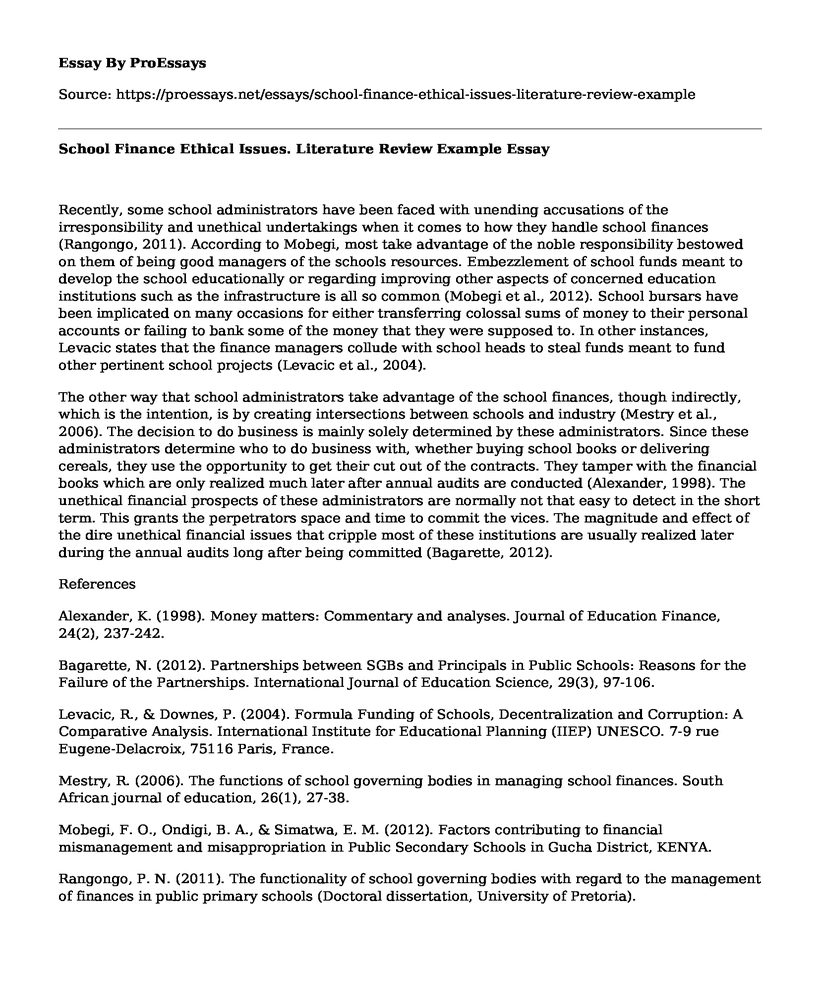Recently, some school administrators have been faced with unending accusations of the irresponsibility and unethical undertakings when it comes to how they handle school finances (Rangongo, 2011). According to Mobegi, most take advantage of the noble responsibility bestowed on them of being good managers of the schools resources. Embezzlement of school funds meant to develop the school educationally or regarding improving other aspects of concerned education institutions such as the infrastructure is all so common (Mobegi et al., 2012). School bursars have been implicated on many occasions for either transferring colossal sums of money to their personal accounts or failing to bank some of the money that they were supposed to. In other instances, Levacic states that the finance managers collude with school heads to steal funds meant to fund other pertinent school projects (Levacic et al., 2004).
The other way that school administrators take advantage of the school finances, though indirectly, which is the intention, is by creating intersections between schools and industry (Mestry et al., 2006). The decision to do business is mainly solely determined by these administrators. Since these administrators determine who to do business with, whether buying school books or delivering cereals, they use the opportunity to get their cut out of the contracts. They tamper with the financial books which are only realized much later after annual audits are conducted (Alexander, 1998). The unethical financial prospects of these administrators are normally not that easy to detect in the short term. This grants the perpetrators space and time to commit the vices. The magnitude and effect of the dire unethical financial issues that cripple most of these institutions are usually realized later during the annual audits long after being committed (Bagarette, 2012).
References
Alexander, K. (1998). Money matters: Commentary and analyses. Journal of Education Finance, 24(2), 237-242.
Bagarette, N. (2012). Partnerships between SGBs and Principals in Public Schools: Reasons for the Failure of the Partnerships. International Journal of Education Science, 29(3), 97-106.
Levacic, R., & Downes, P. (2004). Formula Funding of Schools, Decentralization and Corruption: A Comparative Analysis. International Institute for Educational Planning (IIEP) UNESCO. 7-9 rue Eugene-Delacroix, 75116 Paris, France.
Mestry, R. (2006). The functions of school governing bodies in managing school finances. South African journal of education, 26(1), 27-38.
Mobegi, F. O., Ondigi, B. A., & Simatwa, E. M. (2012). Factors contributing to financial mismanagement and misappropriation in Public Secondary Schools in Gucha District, KENYA.
Rangongo, P. N. (2011). The functionality of school governing bodies with regard to the management of finances in public primary schools (Doctoral dissertation, University of Pretoria).
Cite this page
School Finance Ethical Issues. Literature Review Example. (2021, Mar 31). Retrieved from https://proessays.net/essays/school-finance-ethical-issues-literature-review-example
If you are the original author of this essay and no longer wish to have it published on the ProEssays website, please click below to request its removal:
- Academic Interest in Human Genetics/Molecular Biology
- Training Course for English Teachers in Libya
- Experience From Your Life That Changed the Way You Think Essay
- Available School Resources for Children With Emotional and Behavioral Problems
- Stock Valuations Paper Example
- Essay Sample on Bringing up a Child
- Hunger in Developing Nations: Effects of Letting a Child Go Hungry - Essay Sample







